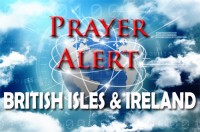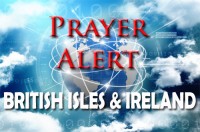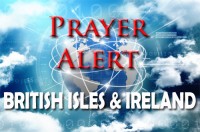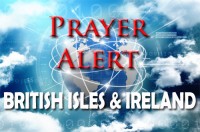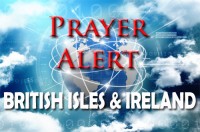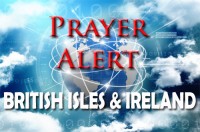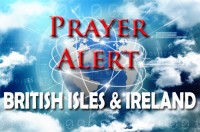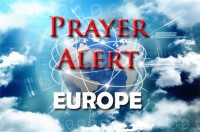Documentary on friars challenges BBC viewers
Five hours of prayer every day, soup kitchens, sharing the Gospel with street people, impromptu guitar jams, amazing beards in the world of a Franciscan friary - all these are featured in a BBC documentary, Friars on a Mission (available for another 19 days on iPlayer). This unique insight into the simple and missional lifestyle of five Franciscan friars in Bradford has testimonies from them and those they have helped. Brother Benedict - who was once promiscuous and heavily involved in drugs before having a life-changing encounter with God - enthuses in a thick Mancunian accent, ‘I’ll always be raving for Manchester, but I’m raving for the Lord.’ Tony, a homeless man, adds, ‘If it wasn’t for the friars, there is a very good possibility I’d be dead.’ Warmth, humility, and joy - not to mention an infectious sense of humour - radiate from them all.
Growth of evangelical churches in Brazil
Pastor Marcio Antonio stands at the pulpit in a one-room evangelical church built precariously above barbed wire fences and illegally hung electrical cables, exhorting his flock in a Brazilian favela to improve their morals. A former drug dealer in Cantagalo, an informally built hillside settlement where most residents lack official property rights, Pastor Antonio and his flock at the Assembly of God Church are part of a growing trend. Evangelical churches are expanding rapidly in Brazil, home to the world's largest Catholic community, especially in poor favelas. These communities, which developed from squatter settlements, often do not have the same services as formal Brazilian neighbourhoods in terms of healthcare, sanitation, transportation or formal property registration. ‘The government doesn't help us so God is the only option for the poor’, Pastor Antonio, 37, told the Thomson Reuters Foundation following his Sunday sermon.
Friday Focus: blessing our communities
God has given you and me the privilege and responsibility of blessing people, communities and land in the name of Jesus, not interceding (although we must do that as well) but speaking out directly. This is powerful when done as part of everyday life. Where this biblical practice is being recovered, salvation and community transformation are taking place.
(written by Roy Godwin, The Ffald-y-Brenin Trust)
Christian student challenges expulsion from university
Felix Ngole, a Christian, has won the right to challenge his expulsion from a social work course at the University of Sheffield because in a discussion on Facebook he had expressed his Christian views on marriage and sexuality. Mr Ngole, a second-year masters student, sought permission on Wednesday for the High Court to review the university's decision judicially after it rejected his internal appeal. The university said that his comments breached a code of professional conduct, but the High Court granted permission for a judicial review. The Christian Legal Centre is representing Felix and will continue to support him, as the case has wide-reaching ramifications for the freedom of Christians.
Election: political parties select candidates
Political parties need to get candidates in place before the deadline of 11 May. Any British, Irish or eligible Commonwealth citizen over 18 with £500 deposit can stand. Pray for God’s guidance for committees in the constituencies as they select candidates. Proverbs 22:29 says, ‘Do you see a man who excels in his work? He will stand before kings, he will not stand before unknown men.’ Pray for men and women to be chosen who excel in their work. All of Labour’s 229 MPs were automatically re-selected, but 12 opted to stand down. Conservatives short-listed candidates for target seats without inviting applications: four MPs stood down. Liberal Democrats hope to have candidates in all seats by next week. UKIP’s selection process has begun; they hope to have candidates nationwide. Pray that there will be no manipulation or inappropriate ‘deals’ affecting choice in the 650 seats.
Know your enemy
Satan has regular tactics. They have recurred across the ages. He loves to conceal himself. Therefore in our personal lives or national situation we could fail to spot him at work. We need to ask a simple question: is this situation creating fear, unbelief or uncertainty? Nationally, as the General Election approaches, there is a fear factor. We saw it dominating the arguments in the Referendum. We need to ask, ‘Is this the normal political hurly-burly or something more sinister?’ We can take a stance in our prayers and say ‘Lord, we stand against the spirit of fear, intimidation and manipulation’. We also see it in the fear of terrorist attacks. Terrorists create fear; we can pray for agents of fear to be brought into the light. Pray for God to enable the police and intelligence forces. Pray against the enemy’s lies and manipulation, particularly where potential terrorists are concerned.
Parents withdraw pupils from RE lessons
The Church of England has about 4,700 schools, educating about one million children each year. A senior CofE official has suggested that parents should lose the right to withdraw their children from RE lessons, because it is being exploited by those who do not want their offspring to learn about Islam and by parents with ‘fundamentalist’ beliefs who do not want their children to learn other world views. Derek Holloway, head of RE in the CofE’s education office, said pupils risked being left with little understanding of religious belief and without the skills to live in a modern and diverse country. This is not confined to any one particular religion or area of the country. At present parents can insist that their children take no part in RE lessons and do not have to provide a reason. Schools must comply with their request.
Acid as a weapon
Data released by the Metropolitan Police showed that the number of reported acid attacks in London rose by 74% in 2016; over 1,800 attacks involving corrosive fluid have been reported since 2010. Acid is a popular weapon for gangs, as it is easy to obtain and it can be difficult to identify the attacker. Schoolchildren are increasingly using acid as a weapon instead of knives. The attacks, known as ‘dosing’, happen when youths smuggle acid or ammonia into school hidden inside drinks bottles. One 18-year-old told the Sunday Times that many were using bottles of cheap household cleaner as weapons. He claimed he has carried acid since he was 12, and said that he could get it for £5 and mess someone’s whole life up. He added, ‘A lot of people ain’t got the heart to stab people. It’s just easier to squirt someone.’ The police are appealing for parents’ help in tackling the problem.
Christians in Parliament: update
An email message from ‘Christians in Parliament’ says, ‘We have been encouraged by increasing numbers of people at our weekly chapel services, with guests preaching from Genesis, the parables of Jesus, and Ruth. During this hectic election period please pray that all Christian candidates will continue to trust the Lord and will find their identity in Him rather than in their political position. Pray that Christians will be elected who will seek to serve God and all people.’ Due to the general election, they have had to cancel some events, but they ask us to pray that when regular events resume the new chapel service series on ‘Faith or Fear’ from Mark’s Gospel, weekly Bible studies for MPs and staff, a dinner for Christian MPs, and afternoon tea in the House of Lords will all have God’s blessing. See also:
Germany: Global Outreach Day has gone global
The Global Outreach Day (GOD), which started in Germany, is now a worldwide movement. Each year, on the last Saturday in May, believers are challenged to reach at least one person with the gospel, either individually or as part of an outreach day organised by the church in their local neighbourhood. It has proved to be extremely successful in extending the Kingdom of God worldwide. Please pray for many more churches to hear about and get involved in this movement across the nations between now and the end of next month. As well as praying for this day to be a success, please remember the GOD leadership team in Germany who are currently under many attacks financially and have had several serious car accidents.



